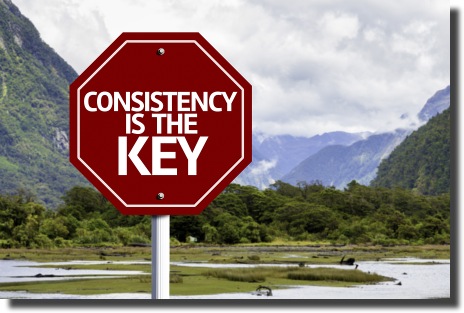 As I mentioned in the 30 Day Guitar Practice Challenge article, to get the most value out of your guitar lessons, it’s critical to make your guitar practice extremely consistent. Without this consistency, then improving your guitar becoming can become a slow and frustrating process. On the other hand, if you practice on a daily, or near-daily basis, then you’re much more likely to progress at a rate that you’re happy with. And this steady progression of your guitar playing skills will make you feel more confident about your ability to improve, and will also motivate you to work even harder.
As I mentioned in the 30 Day Guitar Practice Challenge article, to get the most value out of your guitar lessons, it’s critical to make your guitar practice extremely consistent. Without this consistency, then improving your guitar becoming can become a slow and frustrating process. On the other hand, if you practice on a daily, or near-daily basis, then you’re much more likely to progress at a rate that you’re happy with. And this steady progression of your guitar playing skills will make you feel more confident about your ability to improve, and will also motivate you to work even harder.
If you’ve successfully completed the 30 Day Guitar Practice Challenge, then you’ve already started to make guitar practice part of your daily life. This is fantastic—some guitarists say they want to become better players, but their lack of consistent practice tells a different story. So well done on following through! 🙂
While the 30 Day Guitar Practice Challenge will definitely get you moving in the right direction, what we need to do now is look at a tool, that will make your practice consistent over the long-term…
Introducing The Monthly Guitar Practice Log
The monthly guitar practice log is a tool you can use to easily track the following three metrics…
- How many minutes of practice you do on each day of the month.
- How many minutes of practice you do for the entire month.
- How many missed practice days you had during the month.
Before we talk a bit more about the log, I recommend downloading it and printing it out now. You can do that by clicking on the blue button below…
Download Monthly Guitar Practice Log
The First Table
The first table of the practice log looks like this…
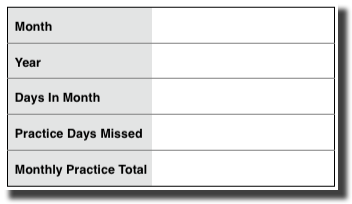
Although it’s probably obvious what to write in each row, for total clarity here’s what each one means…
- Month: Write down what month the practice log is for.
- Year: Write down the current year.
- Days In Month: Write down how many days are in the month that you’re logging your practice. For Example: If the month is June, then you’d write down 30.
- Practice Days Missed: After the month has finished, you’d write down how many days of practice you missed. For Example: If you didn’t do any practice on five days, then you’d write down 5.
- Monthly Practice Total: At the end of the month, you’d write down the total number of minutes that you practiced that month.
Here’s an example of the first table being filled out for the month of June in 2015…
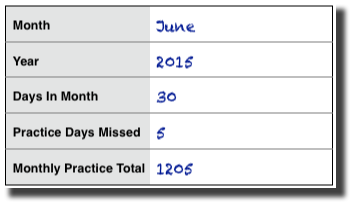
The Practice Logging Table
Now that we’ve looked at the first table, let’s now check out where you’ll log your daily practice . Here’s what this area looks like…
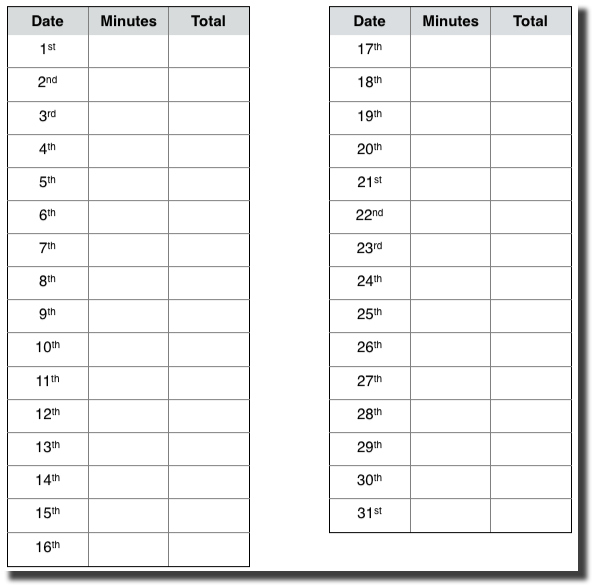
As you can see, there are enough rows for up to 31 days. Of course, if it’s a month like June, that has less than 31 days, then you won’t need to fill out the entire table. Instead you can write N/A, or something similar, for the days that don’t apply.
Here’s what you will need to fill out for each day…
- Minutes: In this area you’ll write down how many minutes of practice you did that day.
- Total: This column is a running total for the month. So in this area you’ll add the minutes practiced that day to the total from the previous day.
To make things totally clear, I’ve prepared an example of this table being filled out for the month of June…
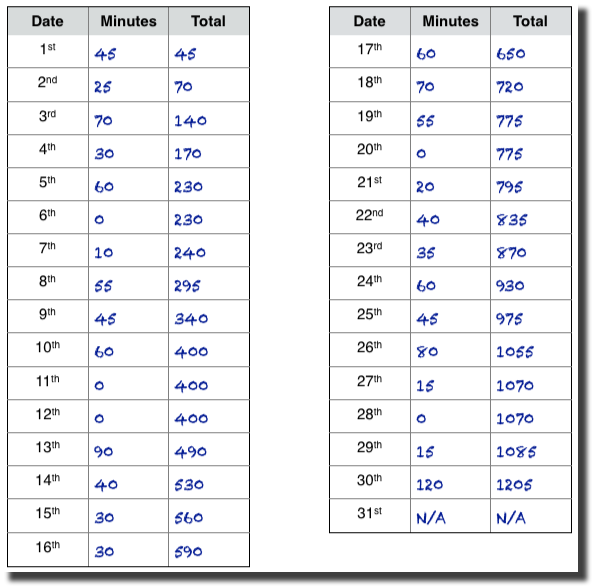
The Notes Section
The last section on the handout is a small area to write notes. Although you’re free to write anything you want, I recommend writing down the reasons why you missed practice sessions. Over time, this would allow you to see if the same reasons keep cropping up. If they do, then it could mean that you need to be honest with yourself, and make some changes to your lifestyle. For Example: If you consistently write down reasons like “I didn’t have time”, then that probably means you need to make guitar practice a higher priority in your life.
A Few Last Words
Keeping a monthly practice log can be a fun and easy way of tracking your guitar practice consistency. It can also really help your guitar teacher to gauge your progress in a more accurate way. So I encourage you to use it for at least a few months. Doing this will give you time to you’ll notice the benefits of doing it. And once this happens, you’ll be hooked—filling it out will become part of your daily guitar practice ritual. 🙂
Are You An Auckland Guitarist That Wants To Significantly Improve Your Electric Guitar Playing?
 If you're an Auckland guitarist wanting to improve your guitar playing, then my Auckland electric guitar lessons might be for you. I can help you to the develop technique, musicianship and mindset that will move you closer to how you truly want to play.
If you're an Auckland guitarist wanting to improve your guitar playing, then my Auckland electric guitar lessons might be for you. I can help you to the develop technique, musicianship and mindset that will move you closer to how you truly want to play.
To find out more about exactly how I can help you improve your playing, then download my latest Auckland guitar lessons info pack below...
